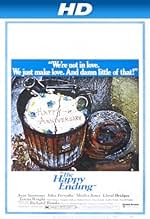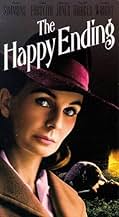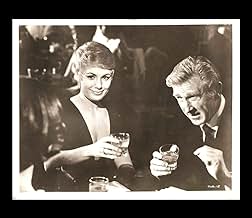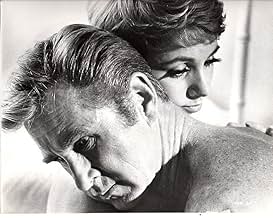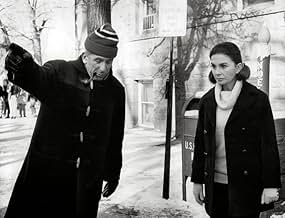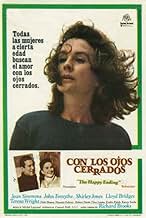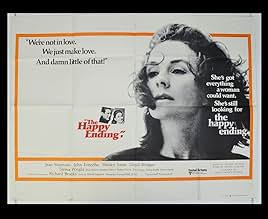AVALIAÇÃO DA IMDb
6,3/10
1,3 mil
SUA AVALIAÇÃO
Adicionar um enredo no seu idiomaA middle-aged woman walks out on her husband and family in an desperate attempt to find herself.A middle-aged woman walks out on her husband and family in an desperate attempt to find herself.A middle-aged woman walks out on her husband and family in an desperate attempt to find herself.
- Indicado a 2 Oscars
- 5 indicações no total
Bobby Darin
- Franco
- (as Robert Darin)
William O'Connell
- Minister
- (as Wm. O'Connell)
Ingrid Bergman
- Self - Actress in 'Casablanca'
- (cenas de arquivo)
- (não creditado)
Humphrey Bogart
- Self - actor in 'Casablanca'
- (cenas de arquivo)
- (não creditado)
Avaliações em destaque
THE HAPPY ENDING might not seem special today, and may well seem very dated in some ways, but we must remember this is the pre-DIARY OF A MAD HOUSEWIFE era. I'm sure the film seemed pioneering in its day, questioning the role of the traditional housewife and demanding that women are entitled to the same satisfaction and autonomy that men expected. Writer-director Richard Brooks often dealt with social issues and political themes--that he took on women's issues is no surprise. The film is especially an acting tour-de-force: Jean Simmons as the unsatisfied woman; John Forsythe as the non-understanding but well-meaning husband; Teresa Wright as Simmons' mother; Dick Shawn and Tina Louise as a miserable couple; Shirley Jones as the woman who survived by having affairs with married men; Lloyd Bridges as a married man with Jones as his mistress; Bobby Darin as a lost and lonely gigolo looking for that one big score. I was also impressed by the film's structure--with two parallel stories a year apart and various flashbacks all presented in such a way that the details of the relationship's coming apart are given to us a little at a time, and we are gradually brought to the point where we understand WHY the present state has become what it is. It's quite well-paced and creates tension throughout. Also, the unexpected and non-traditional ending is perfect. It's tempting to wonder what these rich people are whining about when people in the same community are working two jobs, sixteen hours a day, or starving, or dying of cancer, but Ms. Simmons' performance makes us care about and sympathize with her character. The film would perhaps also be of value as an educational tool for future generations who want to understand the ending of the pre-feminist era. Those who enjoy the teaming of stars Jean Simmons and Shirley Jones and director Richard Brooks should also check out his excellent film version of Sinclair Lewis' ELMER GANTRY. Those who know Shirley Jones only from The Partridge Family might be shocked to see what a fine dramatic actress she is!
The Happy Ending is dated and overlong but Jean Simmons is just terrific as the bored Denver housewife who turns to drink. Simmons earned her only Oscar nomination for this film. Many of the scenes in this film ring very hollow now, especially the "swinging" party where people actually KISS! Shocking. But looking past the hideous 1969 fashions worn by Simmons and Shirley Jones and Tina Louise, the film tries to take a serious look at modern-day marriages. So in counterpoint to the desperate housewives in Denver we get Shirley Jones as a happy hooker approaching 40 and getting a little desperate herself.
Simmons and Jones were college chums away back in 1953. Simmons married; Jones became a party girl. They meet on a plane to the Bahamas as Simmons is running away from her boring boozy life. Jones is shacked up with Lloyd Bridges. So we see the two extremes and two choices open for women. Luckily Simmons sees thru Bobby Darin's awful gigolo act and accent.
Back home Jones is abetted by a pill-popping cleaning lady (Nanette Fabray) who helps her thru her various crises with husband (John Forsythe), mother (Teresa Wright), and daughter(a very unappealing Kathy Fields). And then there are those parties! Poor Tina Louise is stuck married to schmuck Dick Shawn.
Best thing in this movie are the performances. Jean Simmons is just excellent as the smoldering wife who can't quite figure what's gone wrong. Shirley Jones is fine as the tramp. Nanette Fabray is funny and touching as the domestic. John Forsythe is OK as the dumb-ass husband. Tina Louise is good as the bored neighbor. And Teresa Wright is solid as the mother who just can't figure out the new generation and changing times. Dick Shawn and Kathy Fields are both lousy.
The film also boasts the excellent Michel Legrand song, "What Are You Doing the Rest of Your Life?"
Simmons and Jones were college chums away back in 1953. Simmons married; Jones became a party girl. They meet on a plane to the Bahamas as Simmons is running away from her boring boozy life. Jones is shacked up with Lloyd Bridges. So we see the two extremes and two choices open for women. Luckily Simmons sees thru Bobby Darin's awful gigolo act and accent.
Back home Jones is abetted by a pill-popping cleaning lady (Nanette Fabray) who helps her thru her various crises with husband (John Forsythe), mother (Teresa Wright), and daughter(a very unappealing Kathy Fields). And then there are those parties! Poor Tina Louise is stuck married to schmuck Dick Shawn.
Best thing in this movie are the performances. Jean Simmons is just excellent as the smoldering wife who can't quite figure what's gone wrong. Shirley Jones is fine as the tramp. Nanette Fabray is funny and touching as the domestic. John Forsythe is OK as the dumb-ass husband. Tina Louise is good as the bored neighbor. And Teresa Wright is solid as the mother who just can't figure out the new generation and changing times. Dick Shawn and Kathy Fields are both lousy.
The film also boasts the excellent Michel Legrand song, "What Are You Doing the Rest of Your Life?"
Well, The Happy Ending is a textbook example of a late sixties movie by an established director. In as much as it is well intended, partly even "hip" but still missed its audience by a mile. How is that? The late sixties were a bad time for Hollywood filmmakers and producers. The box office numbers dropped and the pressure to have a hit increased. The well-known directors of the thirties, forties and fifties more and more lost contact with the moviegoers. One can almost say that Hollywood made films for a past generation. Looking at the big winners and losers tells you that a new style was in demand. This of course happened world wide.
It is interesting to notice that many of the best directors still had a hit in the early sixties but finished with a big flop in the end of the same decade! The bigger the director, the greater the downfall, I'm tempted to say.
And the failure was not only that not enough people went to see the films. In most cases the public was right and the film was just not good. The producers put pressure on the filmmakers to employ more modern stories and story telling devices and fresh faces. The established directors were not used to this cold wind blowing into their faces, and had little ideas what the public wanted to have changed. Everyone tried something but no one really hit the nail on the head. Let's have a look at some of them. Hitchcock started the sixties with Psycho and ended with Topaz. Billy Wilder started with The Apartment and ended the decade with The Private Life of Sherlock Holmes. Otto Preminger had a big hit with Exodus in 1960 but his last film in the sixties, Skidoo, did so badly with critics and public that few people ever saw it. Frank Capra realized the changes and stopped film-making in 1961.
Fred Zinnemann began the sixties with The Sundowners, had a big Success with A Man of all Seasons, but couldn't get the funding for another project until The Day of the Jackal (1973) since box office in general was going down and producers were scared. Most of the named directors managed to get a foot on the ground again in the seventies and end their career with a respectable picture.
Some managed to have hits till to the middle of the sixties like Robert Wise with Sound of Music, but even that did not help to prevent him from having a bomb with Star!. Richard Brooks had a similar experience with In Cold Blood, that was followed by The Happy Ending. What was going on?
I think the fact that the general interest of the audience changed dramatically throughout the sixties almost completely eluded the Hollywood producers and filmmakers. And when they finally notices and tried to join the new wave it turned out that they have been too old to understand what was going on or that they thought it is enough to get some new faces into their films to appeal to a young and critical audience. Howard Hawks for example tried to jump on the wagon by simply recycling one of his earliest successes The Crowd Roars with new and unknown (and in-experienced) actors but did basically the same thing in Red Line 7000. It was a terrible mistake.
The dinosaur directors only managed to make money by concentrating again on what they did best and Hawks did El Dorado and had a decent swan song with Rio Lobo. Hitchcock tried to join in on the big business with spy movies that made so much money in the form of James Bond or his little brother Harry Palmer. Hitch tried it with Torn Curtain and with Topaz. To be on the safe side he even took a bestseller from Leon Uris (Topaz). The stories as they were told were mainly old fashioned. He had same new ideas in them but the general approach was like the espionage films he did in the thirties. He got out of this loop by going back to the kind of thrillers he was famous for and returned to the screen with Frenzy and had a good final movie with The Family Plot.
The studio system that already started to die with the advent of TV collapsed for good. New directors like Bogdanovich, Scorsese, Coppola and so on began to work for the big studios only after they started for small budget producers, mainly Roger Corman. Others like Dennis Hopper or John Cassavetes had long worked as an actor before being able to direct.
But what exactly is wrong with The Happy Ending? The story line is about a couple after they married. It tries to have a realistic look about problems arising from delusions almost everyone has about "happy ends". Jean Simmons still looks very young and attractive and John Forsythe does his very best. For one thing the constant music playing that lies like a veil over every scene that is really annoying. I'm a big fan of Michel Legrand but this film suffers from the soundtrack he wrote. (Two for the Road is another film that is, theme and music, very similar to The Happy Ending. This time Henry Mancini's music drowns every serious feeling.)
The story drags on and on, we see many episodes that amount to very little. The dialog is dull and everyone moves in upper class levels. The worst thing about The Happy Ending is that everything and everyone seems so boring. At the end you do not care what Jean Simmons decides. You are only glad the movie is over.
It is interesting to notice that many of the best directors still had a hit in the early sixties but finished with a big flop in the end of the same decade! The bigger the director, the greater the downfall, I'm tempted to say.
And the failure was not only that not enough people went to see the films. In most cases the public was right and the film was just not good. The producers put pressure on the filmmakers to employ more modern stories and story telling devices and fresh faces. The established directors were not used to this cold wind blowing into their faces, and had little ideas what the public wanted to have changed. Everyone tried something but no one really hit the nail on the head. Let's have a look at some of them. Hitchcock started the sixties with Psycho and ended with Topaz. Billy Wilder started with The Apartment and ended the decade with The Private Life of Sherlock Holmes. Otto Preminger had a big hit with Exodus in 1960 but his last film in the sixties, Skidoo, did so badly with critics and public that few people ever saw it. Frank Capra realized the changes and stopped film-making in 1961.
Fred Zinnemann began the sixties with The Sundowners, had a big Success with A Man of all Seasons, but couldn't get the funding for another project until The Day of the Jackal (1973) since box office in general was going down and producers were scared. Most of the named directors managed to get a foot on the ground again in the seventies and end their career with a respectable picture.
Some managed to have hits till to the middle of the sixties like Robert Wise with Sound of Music, but even that did not help to prevent him from having a bomb with Star!. Richard Brooks had a similar experience with In Cold Blood, that was followed by The Happy Ending. What was going on?
I think the fact that the general interest of the audience changed dramatically throughout the sixties almost completely eluded the Hollywood producers and filmmakers. And when they finally notices and tried to join the new wave it turned out that they have been too old to understand what was going on or that they thought it is enough to get some new faces into their films to appeal to a young and critical audience. Howard Hawks for example tried to jump on the wagon by simply recycling one of his earliest successes The Crowd Roars with new and unknown (and in-experienced) actors but did basically the same thing in Red Line 7000. It was a terrible mistake.
The dinosaur directors only managed to make money by concentrating again on what they did best and Hawks did El Dorado and had a decent swan song with Rio Lobo. Hitchcock tried to join in on the big business with spy movies that made so much money in the form of James Bond or his little brother Harry Palmer. Hitch tried it with Torn Curtain and with Topaz. To be on the safe side he even took a bestseller from Leon Uris (Topaz). The stories as they were told were mainly old fashioned. He had same new ideas in them but the general approach was like the espionage films he did in the thirties. He got out of this loop by going back to the kind of thrillers he was famous for and returned to the screen with Frenzy and had a good final movie with The Family Plot.
The studio system that already started to die with the advent of TV collapsed for good. New directors like Bogdanovich, Scorsese, Coppola and so on began to work for the big studios only after they started for small budget producers, mainly Roger Corman. Others like Dennis Hopper or John Cassavetes had long worked as an actor before being able to direct.
But what exactly is wrong with The Happy Ending? The story line is about a couple after they married. It tries to have a realistic look about problems arising from delusions almost everyone has about "happy ends". Jean Simmons still looks very young and attractive and John Forsythe does his very best. For one thing the constant music playing that lies like a veil over every scene that is really annoying. I'm a big fan of Michel Legrand but this film suffers from the soundtrack he wrote. (Two for the Road is another film that is, theme and music, very similar to The Happy Ending. This time Henry Mancini's music drowns every serious feeling.)
The story drags on and on, we see many episodes that amount to very little. The dialog is dull and everyone moves in upper class levels. The worst thing about The Happy Ending is that everything and everyone seems so boring. At the end you do not care what Jean Simmons decides. You are only glad the movie is over.
--this film is for you, as you'll hear that song constantly throughout the film.
"The Happy Ending" stars Jean Simmons, John Forsythe, Teresa Wright, Shirley Jones, Nanetete Fabray and Lloyd Bridges, and is directed by Simmons' husband, Richard Brooks. Interestingly, Teresa Wright didn't like his directing and found it pedantic, adding, "but I can't say anything because of Jean." Jean Simmons is one of my favorite actresses and this story serves her well. After twenty years, the lust is gone from Mary Wilson's marriage to husband Fred (Forsythe); she drinks, she pops pills, and finally, after a huge spending spree, her husband takes her credit cards and charge accounts away from her. Her favorite thing is watching old movies which have happy endings; strangely, one of her favorites is Casablanca. Casablanca has a noble ending, even a satisfactory ending. But a happy ending? I mean, Bogie ends up with Louis.
Finally, Mary manages to get her hands on some money, and she takes off for the Bahamas, where she is taken in by an old school friend (Shirley Jones), the "other woman" in several relationships who now finds herself involved with Lloyd Bridges, looking pretty darn good, I might add.
The film seems to be a series of flashbacks and music videos; it is surprising how little dialogue there actually is. Jean Simmons at 40 is radiantly beautiful as usual and she does a great job as Mary. Simmons was a totally underrated actress, squeezed in as she was with the likes of Audrey Hepburn and Elizabeth Taylor. Brooks again has cast Shirley Jones as a bad girl, and again, she's effective. Teresa Wright plays Mary's mother, who can't quite understand her daughter's quest for happiness. Mary wants the fairytale.
I found this film just okay, at times confusing because of the seamlessness of the flashbacks, and frankly, I got sick of hearing "What are you doing...", a song a young man once sang to me and informed me that he had written it. Right.
Anything with Simmons is worth seeing, but at times, this one is tough going.
"The Happy Ending" stars Jean Simmons, John Forsythe, Teresa Wright, Shirley Jones, Nanetete Fabray and Lloyd Bridges, and is directed by Simmons' husband, Richard Brooks. Interestingly, Teresa Wright didn't like his directing and found it pedantic, adding, "but I can't say anything because of Jean." Jean Simmons is one of my favorite actresses and this story serves her well. After twenty years, the lust is gone from Mary Wilson's marriage to husband Fred (Forsythe); she drinks, she pops pills, and finally, after a huge spending spree, her husband takes her credit cards and charge accounts away from her. Her favorite thing is watching old movies which have happy endings; strangely, one of her favorites is Casablanca. Casablanca has a noble ending, even a satisfactory ending. But a happy ending? I mean, Bogie ends up with Louis.
Finally, Mary manages to get her hands on some money, and she takes off for the Bahamas, where she is taken in by an old school friend (Shirley Jones), the "other woman" in several relationships who now finds herself involved with Lloyd Bridges, looking pretty darn good, I might add.
The film seems to be a series of flashbacks and music videos; it is surprising how little dialogue there actually is. Jean Simmons at 40 is radiantly beautiful as usual and she does a great job as Mary. Simmons was a totally underrated actress, squeezed in as she was with the likes of Audrey Hepburn and Elizabeth Taylor. Brooks again has cast Shirley Jones as a bad girl, and again, she's effective. Teresa Wright plays Mary's mother, who can't quite understand her daughter's quest for happiness. Mary wants the fairytale.
I found this film just okay, at times confusing because of the seamlessness of the flashbacks, and frankly, I got sick of hearing "What are you doing...", a song a young man once sang to me and informed me that he had written it. Right.
Anything with Simmons is worth seeing, but at times, this one is tough going.
Take a good look at the film credits of Jean Simmons especially during the Fifties and you'll find that woman has been in some of the best movies ever made. Yet nary an Oscar nomination for her until The Happy Ending and she lost that year to Maggie Smith for The Prime of Miss Jean Brodie.
A great example of this would be Elmer Gantry where Jean did not get a nomination unlike the Oscars won by her co-stars Burt Lancaster and Shirley Jones. Yet she did walk off with the director Richard Brooks who became her second husband. It was Brooks who wrote and directed The Happy Ending about a woman tipping into forty something who still has a whole lot of silly romantic notions.
Jean and husband John Forsythe are approaching their twentieth anniversary together and she feels in a rut. So she indulges in all kinds of bad behavior, runs up huge charge account bills, starts drinking like a fish, runs away to a vacation in the Bahamas where an old college pal, Shirley Jones, takes her in.
Elia Kazan in the same year 1969 did a similar film from the man's point of view, The Arrangement which starred Kirk Douglas. The Happy Ending however is far better and it might really have been interesting if Deborah Kerr in that film had gone off the edge the way Jean does here.
In The Happy Ending Jean loves watching Casablanca and I find it fascinating that she picks that as a great romantic film. If memory serves that's the one where Humphrey Bogart and Ingrid Bergman give up their personal happiness for what they conceive as the greater good.
I do like Shirley Jones in this film as the old college sorority chum who eschewed marriage to just being a permanent 'other' woman. She's had three so far and she's accompanying a fourth to Nassau in the person of Lloyd Bridges. It's fascinating that only Richard Brooks cast Shirley in parts where she wasn't a goody goody and she won great acclaim and an Oscar for being prostitute in Elmer Gantry.
Jean's partial solution to her problems in the end is a very typical feminist one which I will not reveal. As to whether she's damaged her relationship with Forsythe beyond repair, that's anyone's guess.
You will also like Teresa Wright as Jean's mother, Bobby Darin as an about to go over the hill gigolo, and Tina Louise as the neighbor who's ready to take Jean's place with Forsythe any time.
Besides Jean Simmons nomination, The Happy Ending also was nominated for Michel LeGrand's classic song, What Are You Doing The Rest Of Your Life, a question Jean is struggling to answer all the film long.
The Happy Ending is a good and mature film that could only have been made once the sacred Code was abandoned. Too bad though that it could not have resulted in an Oscar for its star.
A great example of this would be Elmer Gantry where Jean did not get a nomination unlike the Oscars won by her co-stars Burt Lancaster and Shirley Jones. Yet she did walk off with the director Richard Brooks who became her second husband. It was Brooks who wrote and directed The Happy Ending about a woman tipping into forty something who still has a whole lot of silly romantic notions.
Jean and husband John Forsythe are approaching their twentieth anniversary together and she feels in a rut. So she indulges in all kinds of bad behavior, runs up huge charge account bills, starts drinking like a fish, runs away to a vacation in the Bahamas where an old college pal, Shirley Jones, takes her in.
Elia Kazan in the same year 1969 did a similar film from the man's point of view, The Arrangement which starred Kirk Douglas. The Happy Ending however is far better and it might really have been interesting if Deborah Kerr in that film had gone off the edge the way Jean does here.
In The Happy Ending Jean loves watching Casablanca and I find it fascinating that she picks that as a great romantic film. If memory serves that's the one where Humphrey Bogart and Ingrid Bergman give up their personal happiness for what they conceive as the greater good.
I do like Shirley Jones in this film as the old college sorority chum who eschewed marriage to just being a permanent 'other' woman. She's had three so far and she's accompanying a fourth to Nassau in the person of Lloyd Bridges. It's fascinating that only Richard Brooks cast Shirley in parts where she wasn't a goody goody and she won great acclaim and an Oscar for being prostitute in Elmer Gantry.
Jean's partial solution to her problems in the end is a very typical feminist one which I will not reveal. As to whether she's damaged her relationship with Forsythe beyond repair, that's anyone's guess.
You will also like Teresa Wright as Jean's mother, Bobby Darin as an about to go over the hill gigolo, and Tina Louise as the neighbor who's ready to take Jean's place with Forsythe any time.
Besides Jean Simmons nomination, The Happy Ending also was nominated for Michel LeGrand's classic song, What Are You Doing The Rest Of Your Life, a question Jean is struggling to answer all the film long.
The Happy Ending is a good and mature film that could only have been made once the sacred Code was abandoned. Too bad though that it could not have resulted in an Oscar for its star.
Você sabia?
- CuriosidadesTeresa Wright was just 11 years older than Jean Simmons, who was playing her daughter.
- Erros de gravaçãoDuring the opening-credit sequence, many late-model 1960's cars are seen in flashback scenes supposedly set 15 years earlier.
- Citações
[last lines]
Mary Wilson: If... if right now we were not married, if you were free, would you marry me again ?
- Versões alternativasThe film was originally submitted to the MPAA for an R rating. After United Artists found Richard Brooks' intended cut too depressing, the studio forced to cut the film into a "moviegoer friendly" cut that was rated M. Brooks' R-rated cut was released in other countries as intended but was not released in the United States until 2016.
- ConexõesFeatures Susan Lenox (1931)
- Trilhas sonorasWhat Are You Doing the Rest of Your Life?
Music by Michel Legrand
Lyrics by Alan Bergman and Marilyn Bergman
Sung by Michael Dees
Principais escolhas
Faça login para avaliar e ver a lista de recomendações personalizadas
- How long is The Happy Ending?Fornecido pela Alexa
Detalhes
- Tempo de duração1 hora 57 minutos
- Proporção
- 2.35 : 1
Contribua para esta página
Sugerir uma alteração ou adicionar conteúdo ausente

Principal brecha
By what name was Tempo para Amar, Tempo para Esquecer (1969) officially released in India in English?
Responda

